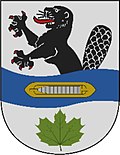Helfenberg | |
|---|---|
 Location in the district | |
| Coordinates: 48°32′36″N14°08′33″E / 48.54333°N 14.14250°E | |
| Country | Austria |
| State | Upper Austria |
| District | Rohrbach |
| Government | |
| • Mayor | Josef Hinterberger (ÖVP) |
| Area | |
• Total | 9.61 km2 (3.71 sq mi) |
| Elevation | 567 m (1,860 ft) |
| Population (14 June 2016) [1] | |
• Total | 1,004 |
| • Density | 100/km2 (270/sq mi) |
| Time zone | UTC+1 (CET) |
| • Summer (DST) | UTC+2 (CEST) |
| Postal code | 4184 |
| Area code | 0 72 16 |
| Vehicle registration | RO |
| Website | www.helfenberg.at |
Helfenberg is a municipality in the district of Rohrbach in the Austrian state of Upper Austria.


